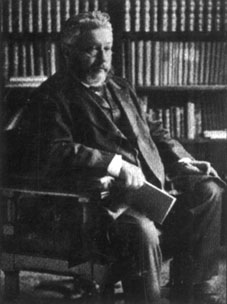Apr
10
2009
Do the words ‘Love, joy, peace, patience, kindness, self-control’ make you think of old ladies, tea cups, embroidered Bible bookmarks and homemade jam?

Perhaps if we looked to the Old Testament for examples of godliness instead of 19th century pietism we men would do better and so would our churches.
Think of Abraham’s kindness as he plunders the kings of the plain to rescue his nephew! His self-control as he refuses the riches of Egypt and Sodom! Solomon’s national peace after the destruction of his father’s enemies! His throwing of loud, generous and very alcoholic parties to express his joy! Because of their great love, Paul risking his life to stand and preach publicly, and Jesus using cutting words to tell off the Jews for their neglect of mercy and justice. And of course, the very masculine patience of Job in the face of continuous accusations.
These might seem a bit offbeat, but it would sure help us to think more this way. If these don’t sound very Christian you should read your Bible instead of your embroidered bookmark. Otherwise, go ahead and join the Women’s Guild.
I guess it boils down to active versus passive godliness.
Comments Off | tags: Abraham, Job, Masculinity, Paul, Solomon | posted in Christian Life
Apr
10
2009
 “And now, indeed, the hand of the Lord is upon you, and you shall be blind, not seeing the sun for a time.” And immediately a dark mist fell on him, and he went around seeking someone to lead him by the hand.” Acts 13:11
“And now, indeed, the hand of the Lord is upon you, and you shall be blind, not seeing the sun for a time.” And immediately a dark mist fell on him, and he went around seeking someone to lead him by the hand.” Acts 13:11
The blindness of Elymas caused Sergius Paulus to believe. The temporary blindness of a Jew brought about the conversion of a Gentile.
A repeated symbolic concept in Scripture is that of sight and blindness. Samson and King Zedekiah both lost their eyes. Isaac and Eli were blind. From Genesis 1:4, 3:6 and 6:2 we learn that eyes are organs of discernment and judgment. The process of maturity makes wise judges who are “the eyes of the Lord”, walking “to and fro on the earth”, collecting evidence to present before His court. Bible symbols are consistent, and their meanings become plain to the saints with their “new eyes.” Those who refused to obey the gospel twisted the Scriptures to their own destruction (2 Peter 3:16).
“For I do not desire, brethren, that you should be ignorant of this mystery, lest you should be wise in your own opinion, that blindness [hardness] in part has happened to Israel until the fullness of the Gentiles has come in.” Romans 11:25
…Herod and the Jews had symbolically become Egypt, hardened like Pharaoh (Romans 9:17-18; Hebrews 3:16; 8:9; 11:26-29; Jude 1:5; Revelation 11:8). The old Jerusalem was Hagar, and the New Jerusalem was Sarah. Christians, not Jews, were “the promised child.” Judaism had become childless like Naomi, and it was only the “fullness” of outsiders, Peter’s “unclean animals”—Ruth—that rescued the people of God from spiritual famine, the extinction of unbelief. The barrenness of Egypt was replaced with the harvest of Pentecost.
…Agabus the prophet foretold a famine in Judea (the curse for the shedding of Stephen’s innocent blood), but the Antioch saints sent relief (the richness of ‘Ruth’) to those in Judea.
Comments Off | tags: Acts, Isaac, Paul, Ruth, Samson, Typology, Zedekiah | posted in Biblical Theology, The Last Days, Totus Christus
Apr
10
2009
Counterfeit Kingdom Come
Then the dragon became furious with the woman and went off to make war on the rest of her offspring, on those who keep the commandments of God and hold to the testimony of Jesus. And he stood on the sand of the Sea. Revelation 12:17 [ESV]

“After a number of years of peace for the Church (Acts 9:31), Wormwood poured out his poisonous waters, false Judaising doctrines, to try and corrupt the woman. God raised up Paul to defeat Satan and the Judaisers, and meanwhile the land (the Circumcision) drank up his false doctrine. Satan has engaged in two tactics: persecution and corruption. These have failed. So now he decides to return to persecution, but this time against the non-Jewish believers, the “rest of her offspring”. He stands on the sands of the sea, addressing the Roman Gentile sea, and raises up the Sea Beast.”1
Continue reading
Comments Off | tags: Amalek, Compromise, Daniel, Haman, James Jordan, Nebuchadnezzar, Paul, Revelation, Satan, Totus Christus | posted in Against Hyperpreterism, Biblical Theology, The Last Days, Totus Christus
Apr
10
2009
You will remember that St. Paul is another Jonah and he takes the Gospel to the Gentiles. He forsakes the Jews and, in fact, at the end of Acts 28, he really casts them off and says judgment has come upon them to the uttermost. Of course, a few years later it does—in the destruction of Jerusalem. Yet Paul says, if it were possible, I wish that I could be damned for my brethren in Israel.
Paul had the same attitude as Jonah had, of wanting to see his own people saved. But unlike Jonah, Paul is willing to obey God… he sees that God has compassion on the Gentiles in and of themselves. Jonah, however, has to be persuaded of this. Jonah is so concerned about his own congregation back home that he doesn’t want to take the Gospel elsewhere for fear that it will have bad results in Israel.
James B. Jordan, The Book of Jonah lectures www.wordmp3.com
Comments Off | tags: James Jordan, Jonah, Paul | posted in Biblical Theology, Quotes
Apr
8
2009
A sample of the new ESV Study Bible was recently made available.
I liked this observation in the notes:
“Jonah’s rescue from death provides an analogy for the resurrection of Christ… The repentance of the Ninevites anticipates the wide-scale repentance of Gentiles in the messianic era.”
But not this one: “Humor, as Jonah’s behavior is not only ignominious but also ridiculous.”
When the prophets (like Elijah, Elisha and Jonah) were sent to Gentiles, it was to provoke Israel to jealousy because they would not listen to these prophets. Jonah understood his ministry meant condemnation would come upon his own people:
James B. Jordan said,
“I don’t think Jonah was some loyal nationalistic prophet. Jonah was in there every day complaining, criticising, prophesying, and denouncing the kingdom of northern Israel. It won’t do to say that Jonah didn’t want to take the Gospel to another nation. No, Jonah has something more profound in mind. Jonah was thinking about Deuteronomy 32:21. He didn’t want to take the Gospel to the Gentiles, because to do so was to bring about a curse on the Israelites. ”1
Paul was a more faithful Jonah, understanding this curse but obeying it nonetheless (Romans 9:3; Acts 28:28)
The study Bible looks good though.
1 Lectures on Jonah, available from www.wordmp3.com
[Originally posted 21 August 08]
Comments Off | tags: ESV, James Jordan, Jonah, Paul, Resurrection | posted in Biblical Theology
Apr
8
2009
[Posted by Gordon Cheng at www.solapanel.org]
I’ve appreciated reading the sermons of 19th-century Baptist preacher Charles Spurgeon over the years, and have quoted him on my blog a number of times (not as much as the Pyromaniacs, but still a bit).
 So when I came down with the flu and found myself in bed for three days straight, I thought it would be encouraging to pick up Arnold Dallimore’s short, well-researched biography of the man himself. Sick Calvinists of the world, unite. Spurgeon, so it happens, was a lot sicker than me for most of his life. He was seriously and often crippingly and painfully ill, both mentally (with depression) and physically, from his mid-30s until his death from illnesses at age 57. The same went for his wife Susannah who, because of chronic illness, was more often than not unable to attend the meetings where he preached.
So when I came down with the flu and found myself in bed for three days straight, I thought it would be encouraging to pick up Arnold Dallimore’s short, well-researched biography of the man himself. Sick Calvinists of the world, unite. Spurgeon, so it happens, was a lot sicker than me for most of his life. He was seriously and often crippingly and painfully ill, both mentally (with depression) and physically, from his mid-30s until his death from illnesses at age 57. The same went for his wife Susannah who, because of chronic illness, was more often than not unable to attend the meetings where he preached.
If you haven’t ever read any Spurgeon, do yourself a favour and pick up a book of his sermons where you can, or click through on some of the links in the first paragraph of this post to get just a small taste for his straight-talking, gospel-centred style. Of his Calvinism, Dallimore quotes him (p. 67 of my 1991 Banner of Truth edition) saying
We only use the term ‘Calvinism’ for shortness. That doctrine we call ‘Calvinism’ did not spring from Calvin; we believe that it sprang from the great founder of all truth.
Spurgeon never received any formal theological training, although he’d begun reading Bunyan’s The Pilgrim’s Progress and Foxe’s Book of Martyrs from the age of six, and progressed on to later Puritan writers such as John Owen and Richard Sibbes by the time he was 10.
Here are some other facts and figures I picked up on the way: Continue reading
Comments Off | tags: Biography, Paul, Spurgeon | posted in Quotes
Apr
8
2009
Here is the murderer of Christians, sitting in darkness, realising that he has been wrong. He hears footsteps. A Christian has come to see him, and the first word he hears from the people he has been persecuting when he is at their mercy is “Brother”.
Mark Loughridge
Comments Off | tags: Paul | posted in Quotes





























